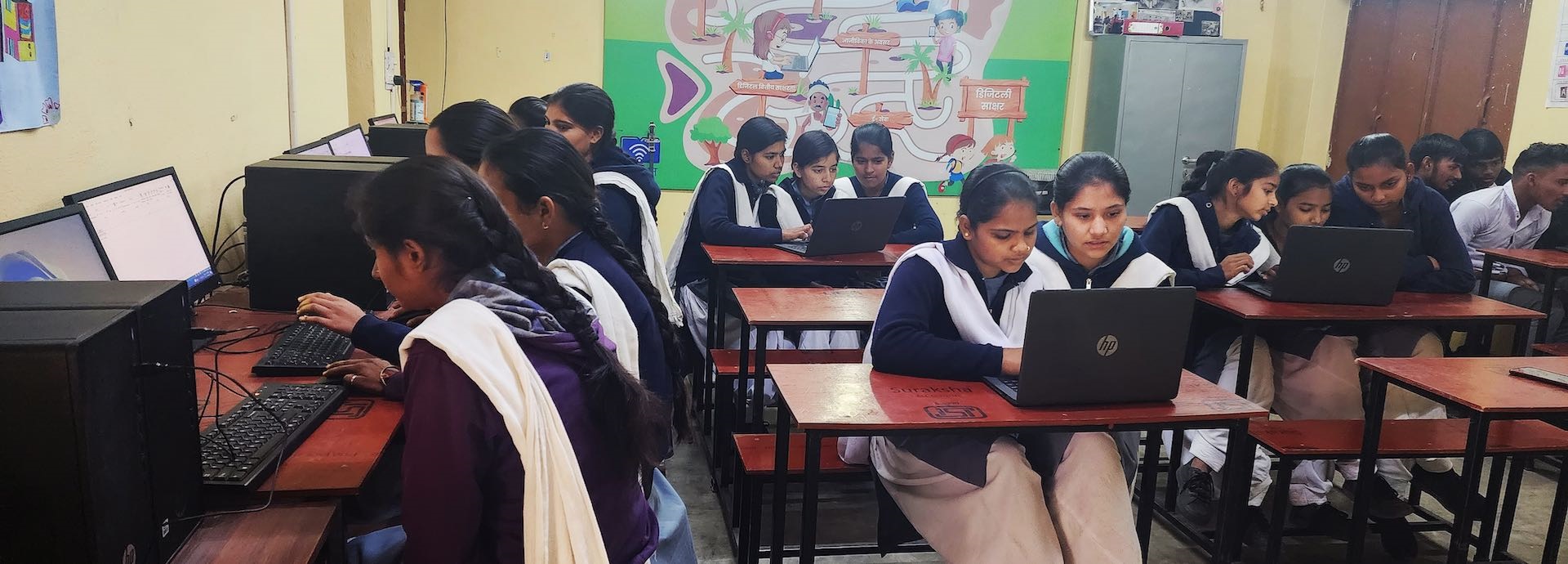

With a population of over 1.4 billion, India will likely overtake China as the world’s most populous nation by 2023. For companies looking to expand their reach and tap into new markets, the wave of digitalisation sweeping the nation – especially after demonetisation in 2016 – presents enormous opportunities. Yet, there is a significant gap between urban areas well-positioned to surf this wave and rural regions left in its wake.
In 2021 less than a quarter of government schools had access to the internet. And almost 30 million students in rural areas reportedly have zero access to digital tools. With much of the world around them becoming increasingly digitalised, there is a recognised need to support these communities. “Digital literacy” allows people to learn new skills, seek employment or further education, take part in social causes, and better manage their finances.
In 2014, recognising the widening rural/urban divide, the Indian government legislated compulsory Corporate Social Responsibility (CSR) for larger companies with high turnover. They are now required to commit 2% of net average profit from the last three years to give back to society.
Initially, many companies simply contributed to a shared fund, but in recent years more organisations are choosing to become directly involved in a CSR initiative or programme.
“Many companies are embracing this requirement as it gives a clear channel for their CSR goals and a chance to reach out and participate,” says Venkatesh R, Managing Director of Wärtsilä India. “Initially, many companies simply contributed to a shared fund, but in recent years more and more organisations are choosing to become directly involved in a CSR initiative or programme.”
Wärtsilä is one such company, and there are multiple programmes based on the CSR pillars happening in different parts of the country. They embrace not only digital literacy but also include “village upliftment” (through sustainability), environmental management and awareness education, and the provision of scholarships and financial support to students from poorer regions. The programmes rely upon a network of proactive and supportive partners.
“We have partners such as Rotary in Chennai, the Finnish Chamber of Commerce (FINCHAM) and reputed local NGOs who are closely vetted,” explains Venkatesh.
Enter the “DigiGyan”
In 2020 Wärtsilä partnered with a local NGO, the Digital Empowerment Foundation (DEF), to set up the first “DigiGyan”, or digital classroom in the industrial town of Bawal, around 150 kilometres from Delhi, close to one of the company’s O&M sites.
“We wanted to do something near our own operations,” explains Manoj Ghode, Director of QEHS, Middle East and Asia at Wärtsilä. “We have a team working at the power plant nearby. We found a great NGO partner in DEF and realised we can have an active project in Bawal.”
Within the walls of the digital classroom, each week 120 students learn common software programmes such as MS Word and Excel and gain other online skills that urban dwellers might take for granted, such as searching for work or study opportunities and how to apply for scholarships or even a passport. It also gives rural youth the chance to dream big.
“Many of these students are not exposed to the outside world. Here they can be aspirational, explore the idea of working in banking or medicine,” says Ghode, adding that career counselling is also built into the curriculum.

ABCs of Corporate Social Responsibility
So how do you get a good CSR project up and running? Especially at first, it needs to address essentials, explains Ghode. Finding an effective local partner, Wärtsilä worked closely with DEF and the local authorities to assess community needs. Then, a space was sourced, desks and benches set up, and the school repainted. The classroom became operational – under strict COVID protocols – in 2020.
“Despite pandemic challenges, students are coming, happy to learn something new. And they’re not just sitting and listening – they’re really engaging and asking questions,” Ghode observes.
Once you’ve been involved with this sort of thing it becomes very close to your heart.
The room contains six laptops, a digital smart board, cameras and tablets and smartphones, as well as “Smart Toolkits” containing images of commonly used apps and software icons. School children aged 13-16 years attend both practical and lecture sessions throughout the week, and on weekends adult community members can attend, with plans to expand operations.
“This school is near the customers’ locations – they’re impressed. Now a plan is underway to source a second classroom for the lectures, which would allow for more participants,” says Ghode.
Benefits to the local community are clear, and CSR is not just a matter of compliance, it’s also an investment in brand awareness and future human resources for the country.
“Once you’ve been involved with this sort of thing it becomes very close to your heart. We’re obliged to spend the amount, but how you spend it is more important. We need to make real change,” Ghode concludes.


